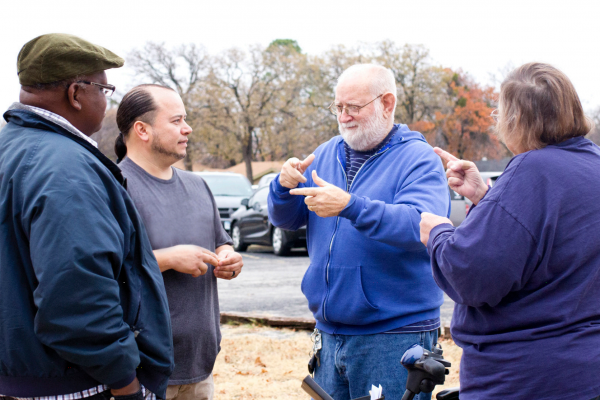
I Think God’s Leading Me to Go … But Where?
If you’re willing to go but don’t know where you’re going, you’re in good company. Many people sense God leading them toward missions before they’re drawn to a specific people or place.
Even though uncertainty about the where and who is common, not having clarity can be stressful; and it might seem wise to simply wait to move forward until you have all the details. But often, God leads us to go before giving us a game plan, just as He called Abram in Genesis 12:1: “Go from your country and your kindred and your father's house to the land that I will show you.”
A few verses later, we read “So Abram went, as the Lord had told him.” (Genesis 12:4) What does it look like to go as Abram did when you’re still seeking direction? Let’s explore seven things to know and do as you’re exploring where to go.
Know that God doesn’t need you. But He delights in using you.
Jesus promised, “I will build my church” (Matthew 16:18)—He will, not us. As Christ’s Body, we enjoy the blessing of being part of His work, but His purposes don’t depend on us.
That means that God’s plan for the nations doesn’t hinge on your “right” decision. Knowing that He’s sovereign and completely able to accomplish His purposes frees us from the fear of choosing the “wrong” location or missing His leading.
Krista, a Christar mobilizer who previously served in Central Asia, explains that God doesn’t always lead to one specific location. “God can use you in a lot of different places,” she shares. “God doesn’t need me. He’s glorified in my obedience. It’s not about the destination.”
Look for opportunities to serve.
God’s leading doesn’t fit into a box. He could direct you through anything from a book you read as a child to a news report to an encounter at the grocery store. However, one way He often guides is through experience.
Many long-term cross-cultural workers first develop a heart for the people group among which they serve through getting involved in ministry in their communities. As you seek God’s guidance, look for opportunities to interact with people from least-reached places, such as serving at an outreach for refugees or frequenting a restaurant owned by a family from a country where few know Jesus.
A short-term trip can also be an excellent way to explore options for ministry and see how you might fit on a cross-cultural team. However, keep in mind that the majority of cross-cultural workers serve among people groups that are already reached with the gospel. So, short-term opportunities that enable you to get a taste of ministry among the least-reached, especially if you’d like to experience ministry among a particular group in a specific place, may not be readily available. However, a trip that immerses you in a similar part of the world or among a diaspora community of the group you’re thinking about can still be an incredibly valuable experience that can help you hone your focus.
God also often leads as His people pray, and regular prayer for the nations or for a specific place or people is an easy way to get involved in the Great Commission. Getting started can be as simple as searching online for information about a country and praying for the needs you discover. In addition, organizations like Joshua Project and Operation World provide resources designed to help you pray intentionally for people groups and countries.
Involve your church.
God also often leads those considering cross-cultural ministry through their local churches. Learn about the workers your church is already sending, talk to your church leaders about any missions priorities they have, and share with them how the Lord has given you a heart to serve Him.
Depending on your church’s approach to missions, you may receive specific guidance … or you may not. If you do, prayerfully consider this counsel, even if it’s not what you expected. Either way, keep the conversation going and ask your church leaders to pray with you and for you.
Cultivate curiosity.
Those who are currently on the field or who have served cross-culturally can be excellent resources as you explore where God is leading you. Look for opportunities to talk with those already serving in the areas of the world you’re considering. Ask questions to learn what’s been particularly challenging and rewarding, and seek to learn what everyday life and ministry are really like. (If you don’t know of anyone to talk to, we’d love to connect you with someone who’s been on the field! Just email us to let us know.)
Don’t idolize longevity.
It can be easy to believe that serving within a community for a lifetime is a sign of ultimate commitment to the Lord and His work. But God calls us to devote ourselves not to a specific place but to Him.
God leads some people to serve in one community for decades or even a lifetime. But He leads others to minister in numerous locations throughout the seasons of their lives.
Andrew, co-director of mobilization, explains that your ultimate goal shouldn’t be to serve in one community for a long time but to see a church planted and then step away—a process that may take many years or may be complete well before you’re ready to retire. “It’s OK to expect long term, but hold it with open hands,” he advises.
Just take the next step.
Don’t stress about having a plan for the rest of your life. Psalm 119:105 tells us that God’s Word gives us “a lamp to my feet and a light to my path." We’re not promised a spotlight to illuminate our entire journey. Instead, the Lord gives us a lamp so we can see our feet and the path right before us.
As you consider your next step, keep in mind that throughout Scripture, specific guidance about where to go and how to serve seems to be the exception rather than the norm. This was the case for Paul and his companions. Though Acts records instances when the apostles were guided specifically, passages such as 1 Corinthians 16:5-9 seems to describe the more typical way they made plans:
“I will visit you after passing through Macedonia, for I intend to pass through Macedonia, and perhaps I will stay with you or even spend the winter, so that you may help me on my journey, wherever I go. For I do not want to see you now just in passing. I hope to spend some time with you, if the Lord permits. But I will stay in Ephesus until Pentecost, for a wide door for effective work has opened to me, and there are many adversaries.”
Paul’s plans seem to be guided not by divine revelation but by observing the opportunities before him and seeking to use them well. He didn’t wait for God to guide him directly, but responded to the doors for ministry that the Lord had opened to him.
Throughout Scripture and the history of the Church, God has used many people who responded not to direct guidance but to needs. While this doesn’t mean that the Lord won’t give you specific direction, understanding this can remove some of the pressure to discern the “right” ministry path.
Rest in God’s sovereignty.
If you’re considering cross-cultural ministry, you believe that God is powerful enough to open the hearts of least-reached people to the gospel and transform lives through this good news. Trust that He’s sovereign in your life as well and that He will guide you as you seek Him even if you don’t always sense how He’s leading you.
Erin, a Christar mobilizer who also served in the Balkans, puts it this way: “We don’t have all the pieces at one time, but God is faithful to continue to lead us. It’s an unfolding process. … Cultivate an open heart and dependence on the Lord.”
As you trust the Lord to lead you, you can rest in His promise that “If any of you lacks wisdom, let him ask God, who gives generously to all without reproach, and it will be given him.” (James 1:5)
We’d love to walk alongside you as you seek wisdom about where to serve! Email [email protected] to connect with us.
Scripture quotations are from The ESV® Bible (The Holy Bible, English Standard Version®), © 2001 by Crossway, a publishing ministry of Good News Publishers. Used by permission. All rights reserved.









































_1724957011_600x400.png)
